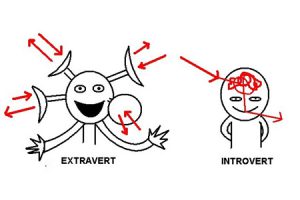 A recent survey reported that the vast majority of supervisors describe themselves as extroverts. You know the type, I’m sure. Maybe you’re thinking of smiling politicians or that marketing-whiz, or maybe you think they are show-off, loudmouthed, button-holers, or even worse, aggressive, belligerent, selfish bullies. Regardless of the obvious aversions, why do companies promote these types of personalities to leadership positions? Well, it may have to do with first impressions. A 1997 University of British Columbia study showed that people initially assign higher intelligence to the talkative extroverted types in their work groups. But, after working together longer, they increase their ratings of a different kind of person – someone who exhibits characteristics that are more associated with introverted personalities. Why? Maybe it’s because tough problems aren’t that easy to solve during chatty socials or with snap decisions; solving complicated problems with in-depth analysis may require more introverted characteristics such as listening, solitary data assessment, scenario analysis, and patience.
A recent survey reported that the vast majority of supervisors describe themselves as extroverts. You know the type, I’m sure. Maybe you’re thinking of smiling politicians or that marketing-whiz, or maybe you think they are show-off, loudmouthed, button-holers, or even worse, aggressive, belligerent, selfish bullies. Regardless of the obvious aversions, why do companies promote these types of personalities to leadership positions? Well, it may have to do with first impressions. A 1997 University of British Columbia study showed that people initially assign higher intelligence to the talkative extroverted types in their work groups. But, after working together longer, they increase their ratings of a different kind of person – someone who exhibits characteristics that are more associated with introverted personalities. Why? Maybe it’s because tough problems aren’t that easy to solve during chatty socials or with snap decisions; solving complicated problems with in-depth analysis may require more introverted characteristics such as listening, solitary data assessment, scenario analysis, and patience.
Some writers have suggested that higher productivity can come from a more equitable workplace – one that gives introverts the quiet time and space they thrive in. My view is that the global business environment is getting faster and more competitive, and that ambitious introverts will have to adapt to succeed, if only to be in a position to influence positive change.
The value of the first impression is clear, leaving introverts with a challenging goal. This personality dichotomy is being solved by many introverts who have learned to adopt a tool kit of extroverted characteristics in order to compete for initial recognition for leadership spots. Familiar training programs such as Dale Carnegie and Toastmasters give introverts a chance to play extroverted roles, while gaining practice in the art of extroversion. The academic study of management and marketing may give introverts the confidence to challenge the status quo in order to offer insightful details. With practice, introverts can use these skills to bring better management to a company. These introverts are being dubbed pseudo-extroverts. You can read more on these viewpoints in the December 10, 2012 Canadian Business article “Why the world needs more introverts”.
Whether you are an overlooked introvert or a senior manager, you and your organization may have a lot to gain from helping introverts break into leadership positions with the necessary skills. Have you noticed this phenomenon in your organization? Have you found ways to develop into a pseudo-extrovert? Comment with your thoughts and insights.